Define humus
How to define humus is something every gardener should be able to do, albeit loosely. It is the secret to a vegetable garden that really performs, not only in terms of nutrition and flavour but also abundance.
It has its origin in another similar word, humification. When organic plant and animal matter fall on the ground, tiny microorganisms feed on it; in the process it is decomposed into minerals, nitrogen and other nutrients.
It is not to be confused with hummus which is a food-paste made with chickpeas.
Plants will take off in soil like this.
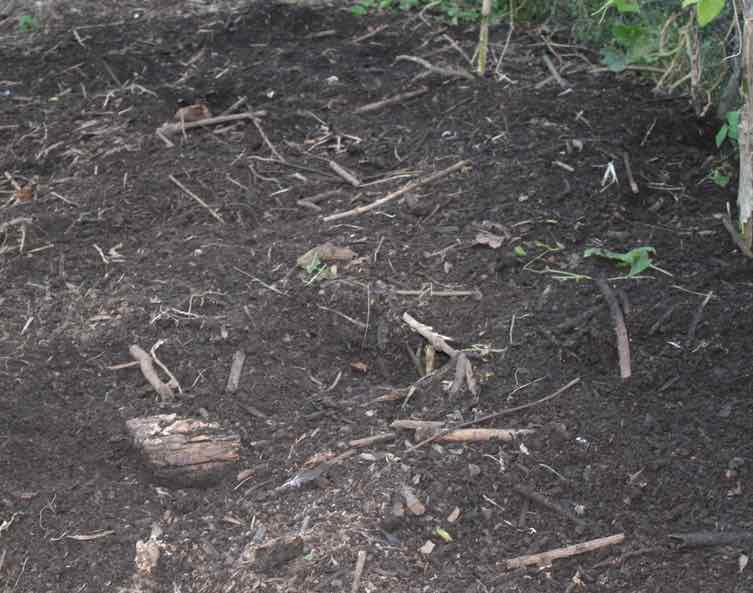
Some of this organic-matter is resistant to the action of these microorganisms, instead forming humus which becomes part of the permanent structure of the soil.
This process of humification can be sped up in a compost heap, especially one that becomes very hot; and also in a worm-farm which has a high concentration of these microorganisms.
One component is a naturally-occurring chemical called humic acid that facilitates the absorption of water and nutrients by the roots of plants, greatly increasing yields without more fertiliser.
In short soil that is rich in this stable humus is seemingly far more fertile, even though it may not have more of the inorganic elements found in typical earth-supplements; they are made readily available.
Humus has a dark, spongy appearance looking for all the world like rich, fertile soil; which, in fact is what it is.
It's all about the organic-matter in soil that makes plants take off.
Define humus
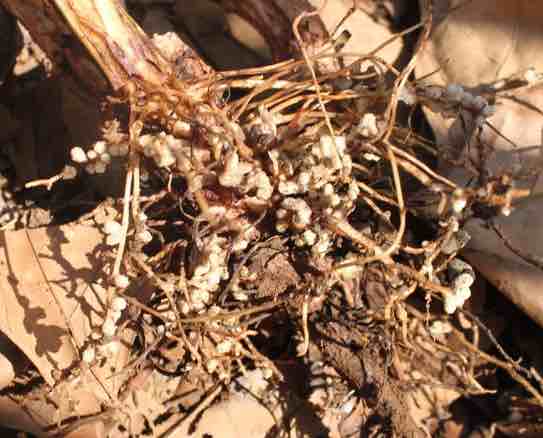 Rhizobia nodules on legume roots capture atmospheric nitrogen
Rhizobia nodules on legume roots capture atmospheric nitrogenWikipedia defines humus as the dark organic-matter that forms in soil when dead plant and animal material decay, with many additional nutrients, especially nitrogen. It serves to replenish the resources used up in our gardens when we harvest our food.
Normally a bean having robbed the soil of nutrients but captured nitrogen from the atmosphere would flower, produce seeds and then die; all would return to Mother Earth. But when we harvest the fruit we have to replace what we have taken with organic humus or commercial fertilisers.
Chicken manure
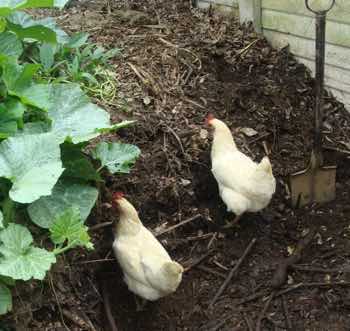
Humus can be further enriched by the addition of manure from animals, in our instance by chickens. They love to feed on the compost-heap, hunting for worms and other microorganisms too small for our eyes to see. They drop their faeces into the pile of plant and even kitchen waste that every home produces.
Cow dung, horse and sheep-manure, of course all have their merits too, enriching your humus pile.
Worm farms
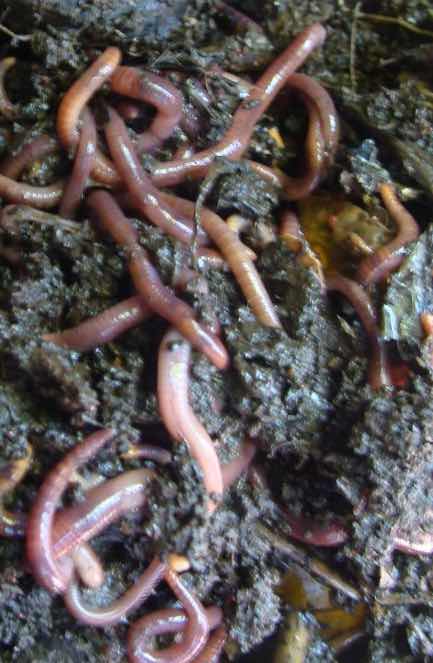
Worm-farms are particularly beneficial for enriching your humus; the possibilities of enhancing your soil really are endless.
Vermi-humus does more than improve the fertility by adding this acid and increasing nutrients like nitrogen; it also enhances the soil structure making it soft and crumbly.
All those helpful microorganisms further improve your soil and, unless it has been sterilised may well contain eggs from the worms which then hatch and further add to the earth.
That is the reason we no longer give the vermi-humus directly to the hens; first it goes to the compost heap for the eggs to hatch and proliferate. Then after a couple of weeks the chickens can start scratching in the pile.
The worm castings are particularly beneficial for your seedlings. And the vermi-leachate even helps by protecting your plants against diseases.
The material expressed on this page is gleaned from the nutritional and environmental literature; it is clearly referenced. A plain distinction is made between the author's opinion and that which is scientifically proven. When in doubt consult your health professional.
To suggest a correction or clarification, write to Dr Bernard Preston here. Contact.
So can you now define humus? At least you have a pretty good idea what it is.
Really it is the major difference between the vegetables that you can grow in your garden and those produced by commercial farmers; it is all about vigorous plants, free from pesticides and inorganic fertilizers, freshly-picked and tasting out of this world.
Don at Wizzard Worms is the South African guru.
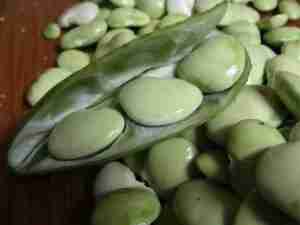
You simply cannot purchase fresh lima-beans like these. They are unbelievably delicious and nutritious in any dinner.
We even have them in eggs Hilton for breakfast sometimes; legumes stay with you the whole day, banishing those nasty hunger pangs that make us reach mid-morning for a candy bar or cola.
They add a satiety-factor that continues long after food; known as the "subsequent meal effect."
Planting your seedlings in this rich humus is so rewarding; they take off in the spring once there is warmth and moisture in the soil. First the spring rains or, if you have have been harvesting the manna from the skies in the wet months, then you could irrigate.
We call all this the synergy of green living.
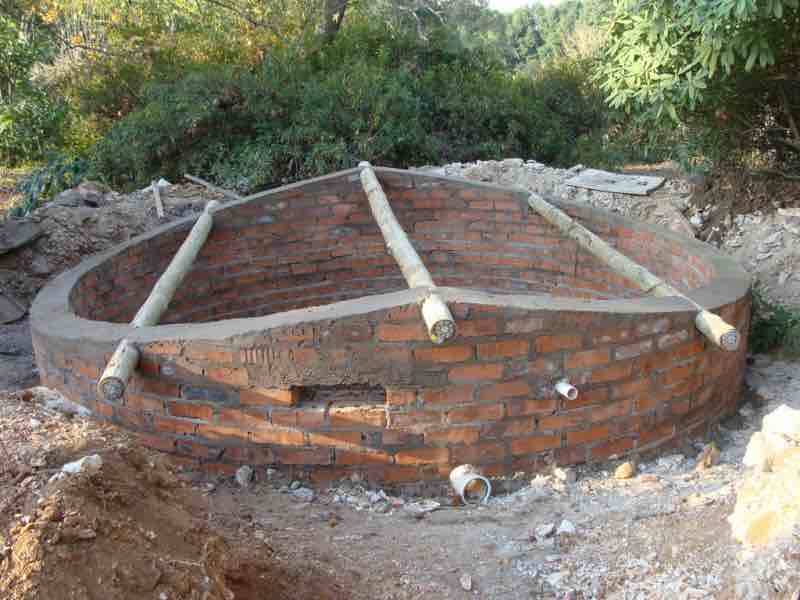
Whilst humus does make any water in the soil more available to plants, there is still a need for irrigation. Harvesting and storing the rain, preferably underground so it remains very cold lies at the centre of backyard permaculture.
A structure like this can be built in two weeks making pristine water available for the home and garden.
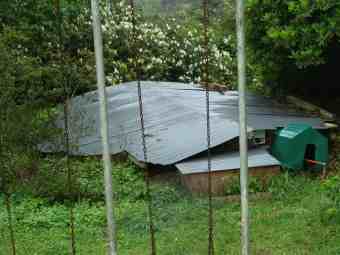
The rain is harvested from the gutters, passes through standard underground conduits to the sump in the foreground for solids to settle out; the water overflows through a simple filter into the reservoir.
For gardeners we recommend two metres deep and 5m in diameter; about 40kL.
Newsletter
Our newsletter is entitled "create a cyan zone" at your home, preserving both yourself and Mother Earth for future generations; and the family too, of course. We promise not to spam you with daily emails promoting various products. You may get an occasional nudge to buy one of my books.
Here are the back issues.
- Lifestyle and ideal body weight
- What are ultra-processed foods?
- Investing in long-term health
- Diseases from plastic exposure
- Intensive lifestyle management for obesity has limited value
- A world largely devoid of Parkinson's Disease
- The impact of friendly bacteria in the tum on the prevention of cancer
- There's a hole in the bucket
- Everyone is talking about weight loss drugs
- Pull the sweet tooth
- If you suffer from heartburn plant a susu
- Refined maize meal and stunting
- Should agriculture and industry get priority for water and electricity?
- Nature is calling
- Mill your own flour
- Bake your own sourdough bread
- Microplastics from our water
- Alternative types of water storage
- Wear your clothes out
- Comfort foods
- Create a bee-friendly environment
- Go to bed slightly hungry
- Keep bees
- Blue zone folk are religious
- Reduce plastic waste
- Family is important
- What can go in compost?
- Grow broad beans for longevity
- Harvest and store sunshine
- Blue zone exercise
- Harvest and store your rainwater
- Create a cyan zone at your home
Did you find this page interesting? How about forwarding it to a friendly book or food junkie? Better still, a social media tick would help.
Address:
56 Groenekloof Rd,
Hilton, KZN
South Africa
Website:
https://www.bernard-preston.com